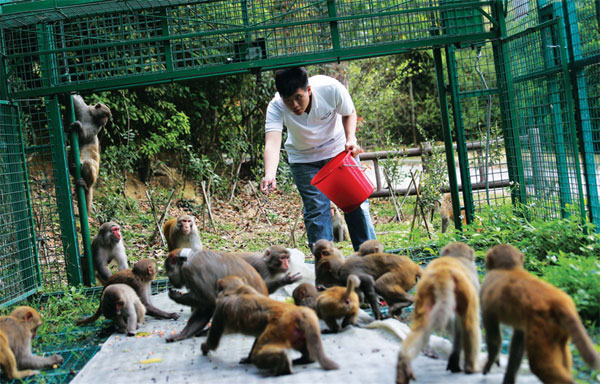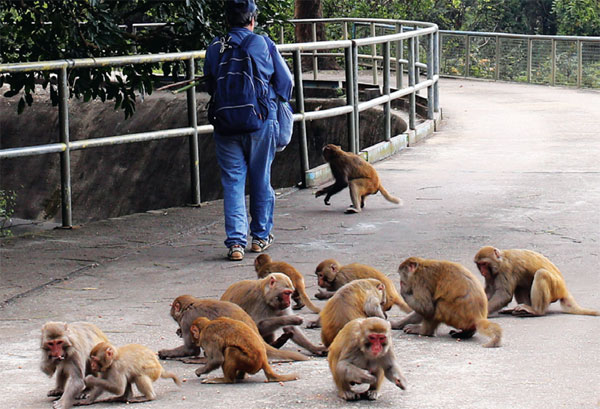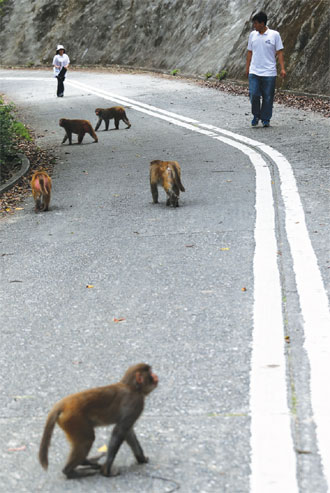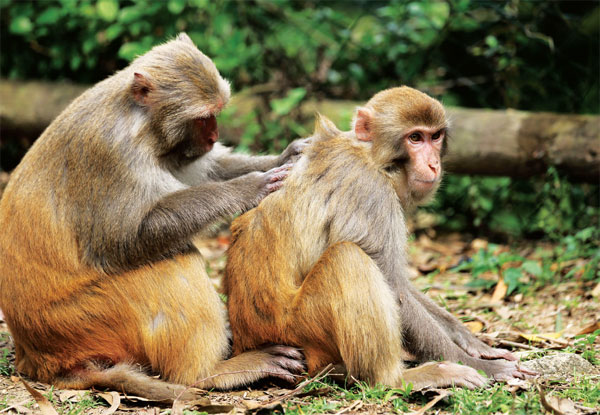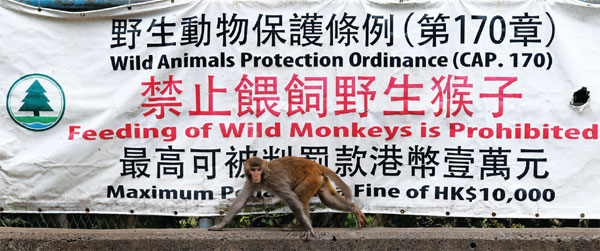Keeping monkey business under control
Updated: 2015-04-21 07:49
By Frannie Guan(HK Edition)
|
|||||||||
Even as monkeys in HK are sterilized periodically, humans entrusted with the duty of looking after them feel there's a lot to learn from simian behavior. Frannie Guan gets up close with the keepers of primates.
'Ooh-ooh-ooh" It's early morning and there's Louis Man at the foot of Kam Shan, calling out to his friends in the language they know best: monkey talk.
It's breakfast time - best way to start the day. Nearly a dozen macaque monkeys emerge from the trees, and fall in behind Man, forming an orderly procession, heading down the mountain slope to the ritual feeding area.
Man knows what they like: peanuts, sunflower seeds, soy beans and sliced apples. He leads his avid followers along the downhill slope, digging into a red bucket for the juicy morsels. Other monkeys take the shortcut - leaping from branch to branch between the trees, moving down the slope.
Man walked back to greet Boss Suo, the 11-year-old hereditary leader of a group of about 50 monkeys called Little Gold. The macaque is a gregarious species. They roam around in "troops". The largest troop in Hong Kong has more than 250 members.
Man, 26, is a survey officer with the Ocean Park Conservation Foundation. He's been assisting the Agriculture, Fisheries and Conservation Department's (AFCD) conservation program since he graduated from Plymouth University with a degree in environmental management, three years ago.
While maintaining this daily ritual of feeding Hong Kong's wild monkeys, Man and his partner, 24-year-old Doris Lo, collect valuable information about the macaque population in Kam Shan, Lion Rock and Shing Mun country parks.
Sterilization program
The feral monkey population in the wilderness surrounding Hong Kong is at risk of exploding completely out of control. So what's with the daily feeding?
Man walks toward a cage, about two meters in height, and begins distributing the food. He throws some into the cage. The AFCD introduced a contraceptive program in 2002. The cages are meant to catch sexually mature monkeys and have their fallopian / spermatic tubes blocked.
Boss Suo, crafty devil, keeps back and focuses on picking up food outside the cage. "The troop leaders are often more alert and clever than others, so it usually takes more time to take away their inhibitions about going into the cage." Man threw a handful of food into the cage. Boss Suo wasn't buying. "He used to be very mean and bad-tempered," said Man. "Sharing food with others? No way in the past."
Man explains that Boss Suo inherited his august stature from his grandfather - long dead. Those born without hereditary rights have to fight to become monarch - just like in the human world. The fighting can get so fierce that blood flows, raw bones are exposed. "Even after being hurt badly, many continue the fight," said Man.
As any good salesman knows sales are built on winning a client's trust. Monkeys are the same. The conservation officers win the animals' trust, get them in the cage, and "Zap! You're sterile." The magic formula is inside the red bucket that Man carries.
There are seven cages, distributed among the Kowloon Hills - each an induction center for fresh recruits for contraceptive surgery.
The AFCD said there were no records of monkeys in the Kowloon Hills until World War I. The presence of alkaloids of strychnos - used in pharmaceutical preparations, naturopathic medicine, and deadly toxic - in the plants that grew on the hills was proving to be a bane in the lives of the local community. So they released rhesus macaques caught from other areas into the wilds around the Kowloon Reservoir in Kam Shan to eliminate the poisonous alkaloids to eat up the fruits which would otherwise drop into the reservoir and contaminate the water supply. Monkeys eating the plants are not harmed by them.
Frequent encounters between monkeys and human beings have made the latter more aggressive. Macaques hijack picnic foods, break into convenience stores and even human residences in search of food. That's when the AFCD decided to go ahead with the sterilization program.
Little Gold and Hairy Girl
A racket erupted among the trees. Boss Suo glanced over toward the sounds and then took to his heels. Man reckoned that the boss had picked up on the sounds of a bigger troop heading their way.
"It is impossible for two troops to stay in the same place, sharing food. The troops have to decide whether to stay and fight or leave. They have to choose one."
The first member of a troop of monkeys Man calls Hairy Girl came into view. There are about 70 on that herd, so named because one of the females has strands of long hair around her ears.
Another troop is called Yeung Gor because one of its members reminds Man of the protagonist in the wuxia (martial arts and chivalry) novel The Return of the Condor Heroes by Jin Yong. "Because he does not have a right arm, just like the character in the novel," explained Man. Man's favorite monkey is named Monchhichi, for her resemblance to the famous monkey toy from Japan.
When Man was little, he often went hiking with the family in Kam Shan areas. He was terrified of monkeys then. But his work with the monkeys during the past three years has completely changed his views. He admits monkeys helped him get a deeper understanding of life.
He is still haunted by the image of a monkey mother, which lost its baby soon after birth from the group he had nicknamed Walnuts Troop. The mother stopped eating. She held the dead infant for four days until the little body started to decay in her arms. Man recalls looking into her desolate eyes, and finding a deeper understanding than ever before about the depth of a mother's love.
Monkey mothers preen their babies, picking fleas from their skin. It's the babies they feed first before eating themselves. The leader of the troop Odd Eye chose a new wife this year, a young beauty who had been blinded in her left eye after being hit by a car. Once they were "married", she did not have to fight for her share of food as other troop members would leave her in peace.
Man and Lo said the accident happened because the female monkey had no natural fear of humans. Some visitors even throw food from the windows of their moving vehicles - drawing the unsuspecting monkeys closer to the traffic.
Her simian family
Since 1999, feeding wild animals in the major wild monkey habitats has been prohibited under the Wild Animals Protection Ordinance. Apart from Man and Lo there are eight people in Hong Kong licensed to feed wild monkeys. The government has ceased to issuing new permits. Among the few remaining is 86-year old Granny Kong, who, having known her simian friends in the territory for more than 40 years, refers to them as if they were her family.
"White Circle is the daughter of Sum Tung. You haven't seen White Circle's grandmother," Kong told Man, throwing a whole apple to a monkey nearby. "I have," she added, proudly, "and I fed her for years."
Kong went on to recall the first time she met White Circle's grandmother. The aged simian had a long iron chain around the neck, which impeded her pace. Kong guessed the grandmother monkey had been someone's pet. "She even smiled at me when I talked to her." Kong went to the AFCD asking if they could help remove the chain, but gave up the idea after learning the removal would require anesthesia. She was afraid the poor old girl might die during the procedure.
Another monkey called Blackie followed her once, all the way downhill, begging for food. "I had exhausted the supplies," said Kong. "'I will come back here tomorrow at around nine to feed you, OK? I promise.' I told Blackie."
When Kong returned the next morning, she found Blackie sitting at the same place. "You think they cannot understand what we say? Yes, they can." said Kong with grave assurance.
Kong is especially generous to the monkeys. Five apples, 10 bananas, peanuts and pies are what she brings to her friends every day. She does not mind the hour-long bus ride to Tai Po, just to buy the food her friends like, a variety of traditional biscuits. Kong is from a well-off family, and her children are happy to support her daily trips financially.
Man said getting to talk to licensed feeders of monkeys always added something to his experience - which he makes it a point to note down.
In the meantime Kong had disappeared along the trail, calling after Blackie. But her voice could be heard, echoing across the hills, calling her children to come and eat, "Blackie, Blackie."
Contact the writer at frannie@chinadailyhk.com
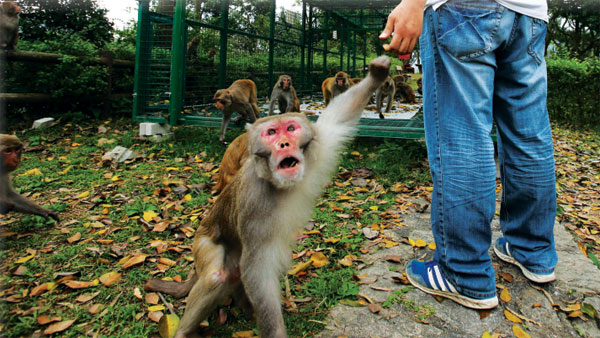
|
Ocean Park survey officer Louis Man serves breakfast to a brood of macaque monkeys. |
|
Granny Kong treats them like family. She has known her simian friends for 40 years now. |
|
Conservation officers win the monkeys' trust to get them in the cage for a sterilization program. |
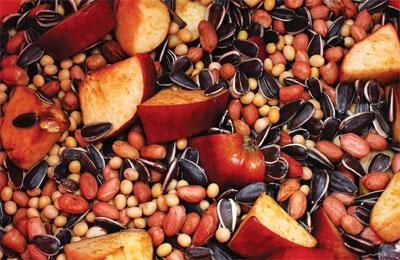
|
Licensed carers for monkeys narrate many extraordinary and emotional tales about bonding between the primates. Edmond Tang / China Daily |
|
Feeding wild animals in the major wild monkey habitats is prohibited since 1999 under the Wild Animals Protection Ordinance. Edmond Tang / China Daily |

(HK Edition 04/21/2015 page7)
